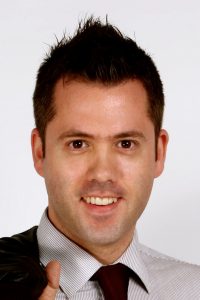In June, CERIC released the Recovery Pulse Survey with the aim of learning more about how COVID-19 was affecting career services in Canada. Nearly 1,150 career professionals from across the country responded. The results revealed a remarkable resilience and innovation from career professionals as they have reimagined their work. However, it also highlighted challenges for organizations and client groups.
To shed more light on the experiences of career professionals working in different areas of the sector during COVID-19, Ben Liadsky, Pulse Survey research analyst and Program Manager at The Counselling Foundation of Canada, reached out to survey participants to hear about how their work has been affected by the pandemic, their advice for their peers and more.
This interview with Dan Walters of Ontario Tech University is the first in a series of Recovery Pulse Survey interviews that will be published on the CareerWise website over the summer.
 Can you tell me a bit about where you work?
Can you tell me a bit about where you work?
I work in the Faculty of Social Sciences and Humanities at Ontario Tech University.
Can you tell me a bit your role?
I’ve been working here since 2003. I am the Experiential Learning Coordinator at the University, a position I started and have held since 2005.
I love my job! I get to have one leg in academia and one out in the community.
It’s an all-dressed potato chip kind of a job where I’m connected to many different conversations. Essentially, I see my role as drawing convergence between student learning and community needs. The students I work with come from a variety of disciplines and have a broad spectrum of interests and goals. Similarly, I’m regularly in touch with different community organizations to understand their needs. It’s not an exact science. There’s often a lot of back and forth and I really need to be a good listener.
More specifically, I meet with our students beginning in their third year to help find them a placement in their fourth year. I meet one-on-one with each student as well as look at their written applications to understand their interests and career goals. Often times, it’s when students go off-script when I’m talking with them one-on-one that I learn something that might help me to find them a good placement. For instance, a student might express that they are interested in social justice and also casually mention that they love playing guitar. This extra tidbit can help me think of different things and opens up new possibilities such as finding a social justice arts organization that may have a music component for this student.
For organizations, I’m regularly scanning websites to see if there’s anything that could lend itself to a student placement. I’m calling people up to ask how things are going. I’m also active in my community and volunteer for a variety of different organizations, which helps me to understand different needs. It’s an ongoing process. Usually these are one-on-one placements, so it’s not like I’m able to place 10 students at one organization.
How has COVID affected how you work?
Back in April, we knew we needed to do more to understand what our community partners needed. Non-profits and the services they offer have been deeply affected and so we wanted to see what our role could be going forward. We reached out to over 350 community partners asking simple questions like: what can we do? How can we help?
I created a document to help track different types of feedback so that we could begin to see where we might be able to assist. From there, I had some of our professors reach out to say that they could help with X or Y. Similarly, we had some of our recent graduates reach out to say they wanted to volunteer.
How has COVID affected your university and students more generally?
The university has taken a financial hit. Things are increasingly moving online and there have been layoffs. We know the stakes are high. We have a lot of first-generation students for instance and there’s a lot of anxiety more generally. The move toward online can be beneficial in some ways, but if the needle moves too far without us acknowledging the drawbacks, the students will call BS. We owe it to the students to shoot straight in our communication with them. It’s on us to help coach them through this uncertainty and navigate the bumps along the way. I’ve had some really honest conversations with students.
At the same time, we have some kind-hearted people in our faculty and a great dean, which gives me faith going forward.
What is something that surprised you from your communication with students?
When I interviewed my fall placement students in May, there was such a sense of optimism. When I told them that their placement was going to be online, I expected I would get pushback, but this didn’t happen. Instead, I heard that online was good because they would have more flexibility. Students also understand the moment. They see that what they will do in their placements can make a real difference for organizations right now.
What advice would you give to others in similar positions based on your experience?
I’ve been using the word priorities quite a bit. Now is a time to reflect on what we really care about. The answer, 100% of the time, has to be the ongoing well-being of our students. So, my advice is to have raw, sometimes uncomfortable conversations with students about how they’re feeling, what their expectations and goals are going forward, and to use that information to inform what you do next and show that you’re listening. In short, make deliberate efforts to check-in. The students are wanting to know what’s going on and we can’t make it all look like sun and rainbows. It’s an opportunity for us to really manage how we handle the upcoming fall. For me, without these regular check-ins, I’d be guessing and getting things wrong. Moreover, when you do this, students see themselves as an active learner as opposed to a passive consumer and get to see themselves as part of the process.
Is there anything else you want to share?
It’s not a new idea, but it’s nonetheless true that there’s power in communication and collaboration. Let’s use this time to figure out how to work together and make things happen. We need to admit that the pre-COVID normal kind of sucked. It benefitted some, but disadvantaged others. Fortunately, I’m seeing a lot more willingness to keep equity in mind as these conversations and plans begin to come together. Of course, there’s still lots of work to be done.
You can learn more about Dan by reading his recent blog post for Ontario Tech University. You can also connect with Dan on LinkedIn.




 Can you tell me a bit about where you work?
Can you tell me a bit about where you work? 


